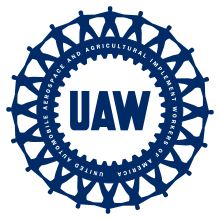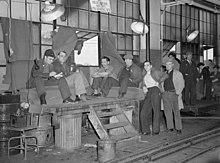United Auto Workers
United Auto Workers (UAW), whose full name is The International Union, United Automobile, Aerospace and Agricultural Implement Workers of America , is a North American union . It was founded in May 1935 and, with around 400,000 members from the automotive , aviation , agricultural machinery and healthcare industries , is one of the most influential unions in the USA and Canada .
General
In particular, workers in the automotive industry are organized in the UAW . Other professional fields in which she is active are, above all, the aviation industry , agricultural machinery construction and healthcare . The UAW, one of the most influential trade unions in North America, is a member of the American Federation of Labor and Congress of Industrial Organizations , the most important umbrella organization for American trade unions, and the Canadian Labor Congress .
With more than 390,000 active members (as of 2012) in around 750 local associations, the UAW is one of the largest unions in the USA and Canada. It currently has around 3,100 collective agreements with around 2,000 companies. Dennis Williams has been President of United Auto Workers since 2014.
The UAW is present in the United States , Canada, and Puerto Rico . Your seat is Detroit .
history
United Auto Workers was founded in May 1935. It was one of the first unions in which African Americans could become members. Two years after its inception, it gained recognition as the representative of workers at General Motors and Chrysler, and with it the industry-wide union organization of workers in the American auto industry. The Ford Motor Company first consented to collective bargaining with the UAW in 1941. Later, the UAW made a decisive contribution to improving the living conditions of industrial workers through successes such as the implementation of employer- funded health insurance . In the 1960s and early 1970s, UAW workers' incomes were among the highest of any industry in the United States.
Beginning with the oil crisis in 1973 and the subsequent loss of market share by the American car companies, however, the United Auto Workers made concessions to employers and some of the benefits they had negotiated were withdrawn. In 1985, after internal disputes, the branch responsible for Canada split off through the establishment of the Canadian Auto Workers . The membership, which in 1945 exceeded a million for the first time, has fallen since its peak of around 1.5 million, which it had reached at the end of the 1970s.
Since the beginning of the 1990s, the UAW has been trying to open up new areas both geographically and by expanding to Puerto Rico , as well as in terms of the professional fields of its members. The National Writers Union, founded in 1981 as a union of freelance writers and journalists , has been a subsidiary of the UAW since 1992, as has the National Organization of Legal Services Workers, established in 1978, as an association of legal employees . Other areas in sectors outside of its conventional industrial fields, in which the UAW is increasingly recruiting members, are administrative and office workers , the employees of non-profit organizations and the student employees of universities ( academic student employees ).
The importance of the Reuther brothers
In the first decades of the American Automobile Workers Union, Walter Reuther and his brothers Victor and Roy had a major influence on the decisions and actions of the UAW. The sons of German immigrants organized the first major strike actions from 1936, successfully using the European sit-in strike, among other things . At the same time they got involved in the Socialist Party and supported its presidential candidate Norman Thomas .
Born in Wheeling, West Virginia in 1907 , Walter Reuther, who trained as a toolmaker, worked at Ford and studied on the side, became head of UAW Office 174 in Detroit West Side at the age of 28. He organized labor disputes and in this position began his ascent in the American labor movement. Against resolute opposition from the Big Three (General Motors, Ford, and Chrysler), the UAW achieved a rapidly growing level of organization among Detroit auto workers. On May 26, 1937, the legendary "Battle of the Overpass" occurred in Dearborn (Michigan). UAW activists who were distributing leaflets on a pedestrian bridge, including Walter Reuther, were attacked and brutally beaten by thugs belonging to the Ford River Rouge Complex security team. In 1940, Reuther caused a national sensation with his plan to use car factories to produce aircraft in view of the growing danger of war. After the end of the war, he urged President Harry S. Truman to accept the Marshall Plan . Under Reuther, the UAW implemented, among other things, the principle of closed shops , i.e. the compulsory membership of a company's workforce in the union. In addition, there were higher wages - later also linked to the development of the cost of living - and improved social benefits such as the company pension after employment with the company from 30 years of service as well as the employer's participation in the medical and hospital costs of the employees. Early on, that is, from the 1950s, Reuther warned of the social and economic consequences that would result from the incipient automation of work processes and from the intensifying global trade flows.
Walter Reuther developed a close collaboration with Truman and later with Presidents John F. Kennedy and Lyndon B. Johnson . In 1948 and 1949, he and his brother Victor were seriously injured in firearm attacks. At this point in time, Walter Reuther was already at the helm of the UAW, having been elected to the office of union president in 1946. He also became President of the CIO in 1952 and Vice President of the trade union confederation AFL-CIO under George Meany in 1955 . Victor Reuther focused on the international activities of the unions, while Roy Reuther became a key organizer and also worked closely with Robert F. Kennedy . In the 1960s, Reuther was involved in the American civil rights movement , supported Martin Luther King and spoke in 1963 during his march on Washington . Internationally, the UAW president made numerous (sometimes highly acclaimed) trips abroad and from 1963 at the Harpsund Conferences in Sweden regularly exchanged views with leading European social democrats about social visions and economic challenges. On May 1, 1959, Walter Reuther had spoken to 600,000 people at the Brandenburg Gate in West Berlin who had gathered there for Labor Day and assured them of the solidarity of the American unions. In 1968, the UAW board decided - not least because of irreconcilable differences between Reuther and Meany - the exit of the auto workers' union from the AFL-CIO - a decision that was revised in 1981 with the re-entry. After his brother Roy had died in 1968, Walter Reuther was killed in a plane crash in Michigan in 1970. The third brother, Victor, wrote his autobiography after his retirement (1972), which is also the history of the American Automobile Workers Union. In 1995 he received the Presidential Medal of Freedom from President Bill Clinton at the White House in Washington , which was awarded posthumously to Walter Reuther.
President
- 1936–1938 Homer Martin
- 1938-1946 RJ Thomas
- 1946–1970 Walter Reuther
- 1970-1977 Leonard Woodcock
- 1977-1983 Douglas Fraser
- 1983-1995 Owen Bieber
- 1995-2002 Stephen Yokich
- 2002–2010 Ronald Anthony Gettelfinger
- 2010-2014 Bob King
- since 2014 Dennis Williams
Individual evidence
- ↑ UAW website ( memento of the original from July 13, 2015 in the Internet Archive ) Info: The archive link was inserted automatically and has not yet been checked. Please check the original and archive link according to the instructions and then remove this notice. accessed on November 14, 2012
- ↑ a b United Auto Workers: About UAW - Who We Are ( Memento of the original from December 16, 2008 in the Internet Archive ) Info: The archive link was automatically inserted and not yet checked. Please check the original and archive link according to the instructions and then remove this notice. (accessed on November 14, 2012)
- ↑ mlive.com - Everything Michigan: UAW membership falls below 500,000 to lowest level since WWII (accessed December 7, 2008)
- ↑ [1] accessed on December 11, 2013
literature
- Nelson Lichtenstein: Walter Reuther. The Most Dangerous Man in Detroit. University of Illinois Press, Urbana and Chicago 1995, ISBN 0-252-06626-X
- John Barnard: American Vanguard: The United Auto Workers During the Reuther Years, 1935-1970. Wayne State University Press, Detroit 2004, ISBN 0-81-432947-0
- Kevin Boyle: The UAW and the Heyday of American Liberalism, 1945-1968. Cornell University Press, Ithaca 1995, ISBN 0-80-148538-X
- Victor G. Reuther: The Reuther Brothers. An autobiography and the history of the United States Automobile Workers Union (UAW). Series: Series of publications by the Otto Brenner Foundation. Volume 30. Bund-Verlag, Cologne 1989, ISBN 3-7663-0553-0 (Original edition: Victor G. Reuther: The Brothers Reuther and the Story of the UAW. A Memoir. Houghton Mifflin Company, Boston 1976, ISBN 0-395 -24304-1 )
- Mike and Pam Smith: The Reuther Brothers. Walter, Roy, and Victor. Detroit Biography Series For Young Readers. Wayne State University Press, Detroit 2001, ISBN 0-8143-2994-2
Web links
- Welcome to the UAW Official Website (English)
- TIME 100 - The Most Important People of the Century: Walter Reuther (English)
- Sasha Reuther: How the UAW Can Get Its Horsepower Back , in: TIME, June 14, 2010
- [2] A life for social justice: The American union leader Walter Reuther (2010, in German; as a word document for download; with a detailed list of literature)
- Wayne State University / Walter P. Reuther Library: No Greater Calling: The Life of Walter P. Reuther (English)
- Documentary "Brothers on the Line" by Sasha Reuther (about the Reuther brothers; in English)

